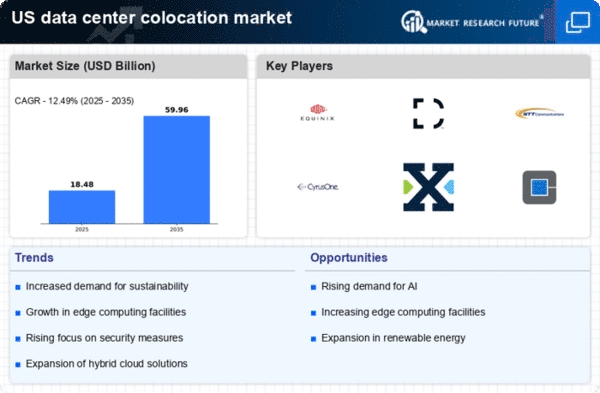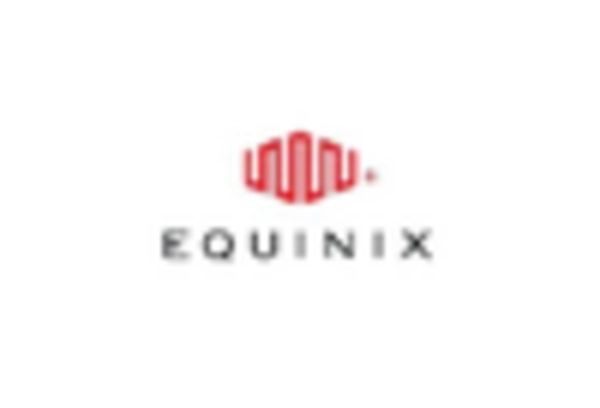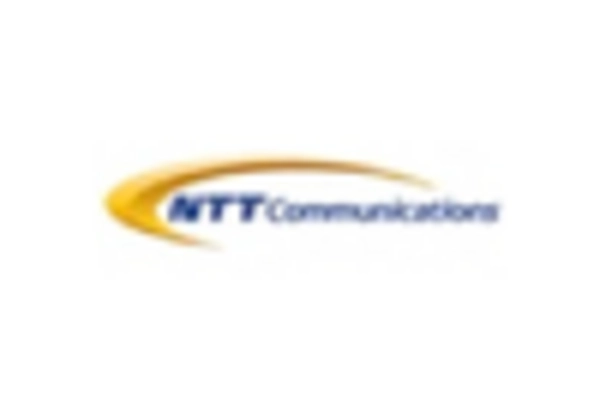Rising Cloud Adoption
The increasing adoption of cloud computing services is a pivotal driver for the data center-colocation market. As organizations migrate their operations to the cloud, they require robust infrastructure to support these services. In the US, cloud service providers are expanding their data center footprints, leading to a surge in demand for colocation services. This trend is evidenced by a projected growth rate of approximately 20% in cloud infrastructure spending over the next few years. Consequently, businesses are seeking colocation facilities that can offer scalable solutions, high availability, and low latency, thereby enhancing the overall performance of their cloud applications.
Emergence of Edge Computing
The rise of edge computing is reshaping the landscape of the data center-colocation market. As businesses increasingly rely on real-time data processing and analytics, the need for localized data centers becomes apparent. Edge computing reduces latency and enhances performance by processing data closer to the source. This trend is particularly relevant in sectors such as IoT and autonomous vehicles, where immediate data processing is crucial. The data center-colocation market is adapting by offering edge solutions that cater to emerging needs. This adaptation could lead to a significant increase in colocation facilities in urban areas.
Growing Focus on Sustainability
Sustainability is becoming a core consideration for businesses, influencing their choice of data center solutions. The data center-colocation market is responding to this trend by implementing energy-efficient practices and utilizing renewable energy sources. Companies are increasingly seeking colocation providers that can demonstrate a commitment to sustainability, as this aligns with their corporate social responsibility goals. In the US, a survey indicated that over 60% of organizations prioritize sustainability when selecting a data center partner. This growing focus on environmental responsibility is likely to drive innovation and investment in sustainable technologies within the data center-colocation market.
Regulatory Compliance Requirements
Regulatory compliance is becoming increasingly stringent across various industries, driving the demand for data center-colocation services. Organizations in sectors such as finance, healthcare, and telecommunications must adhere to specific regulations regarding data storage and security. The data center-colocation market provides a viable solution by offering facilities that meet these compliance standards. For instance, the need for HIPAA compliance in healthcare has led to a notable increase in colocation services tailored for this sector. As regulations evolve, the data center-colocation market is likely to see continued growth as businesses seek to mitigate risks associated with non-compliance.
Technological Advancements in Infrastructure
Technological advancements are a key driver of growth in the data center-colocation market. Innovations in hardware, software, and networking technologies are enabling data centers to operate more efficiently and effectively. For instance, the adoption of advanced cooling solutions and energy-efficient servers is helping to reduce operational costs. Additionally, the integration of AI and machine learning in data center management is enhancing operational efficiency and predictive maintenance. As these technologies continue to evolve, they are likely to attract more businesses to the data center-colocation market, seeking to leverage these advancements for improved performance and cost savings.

















